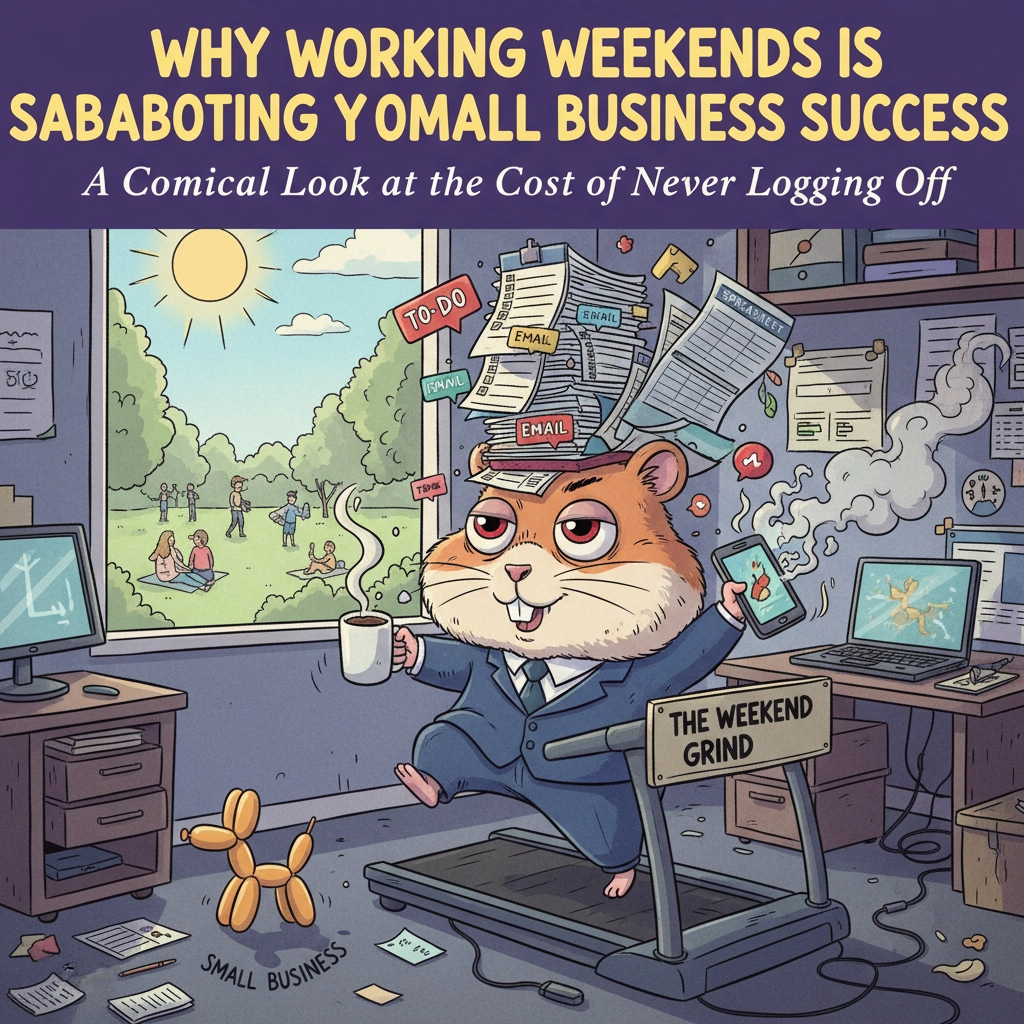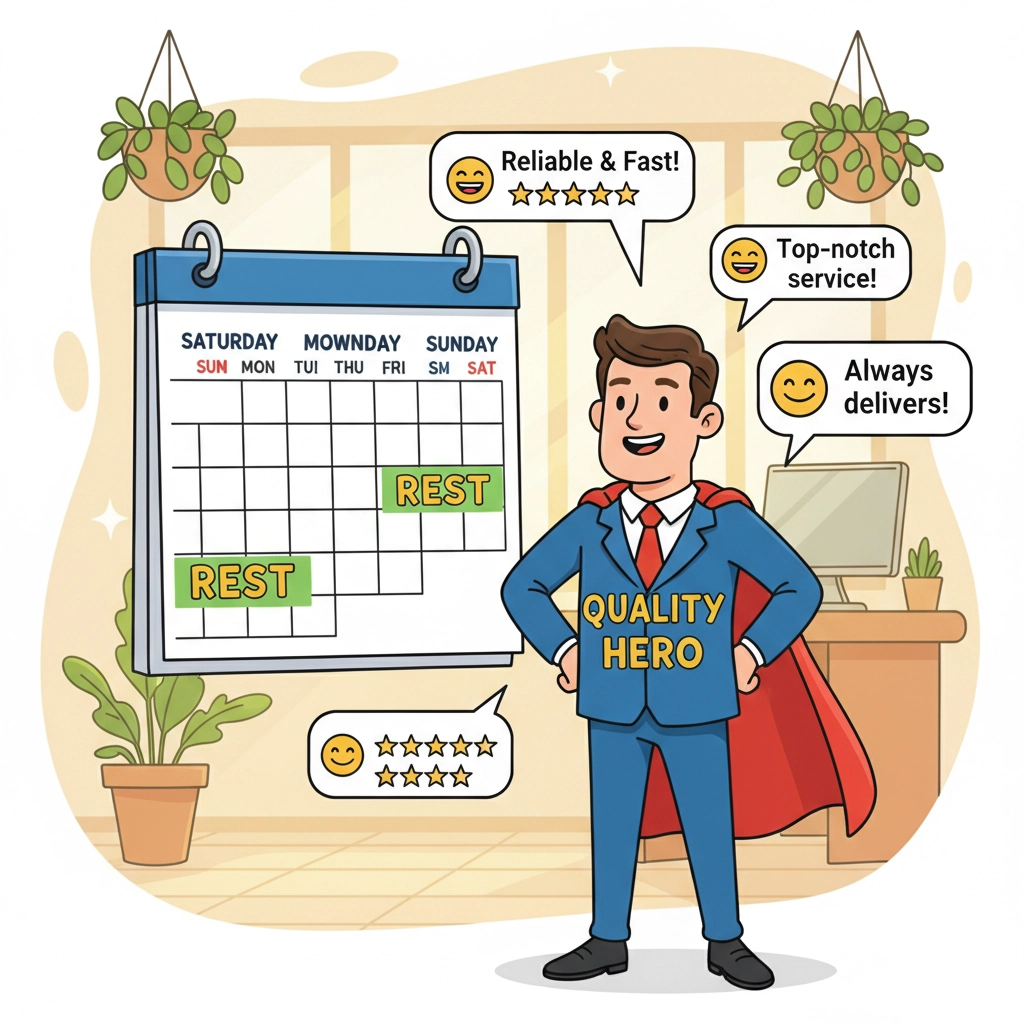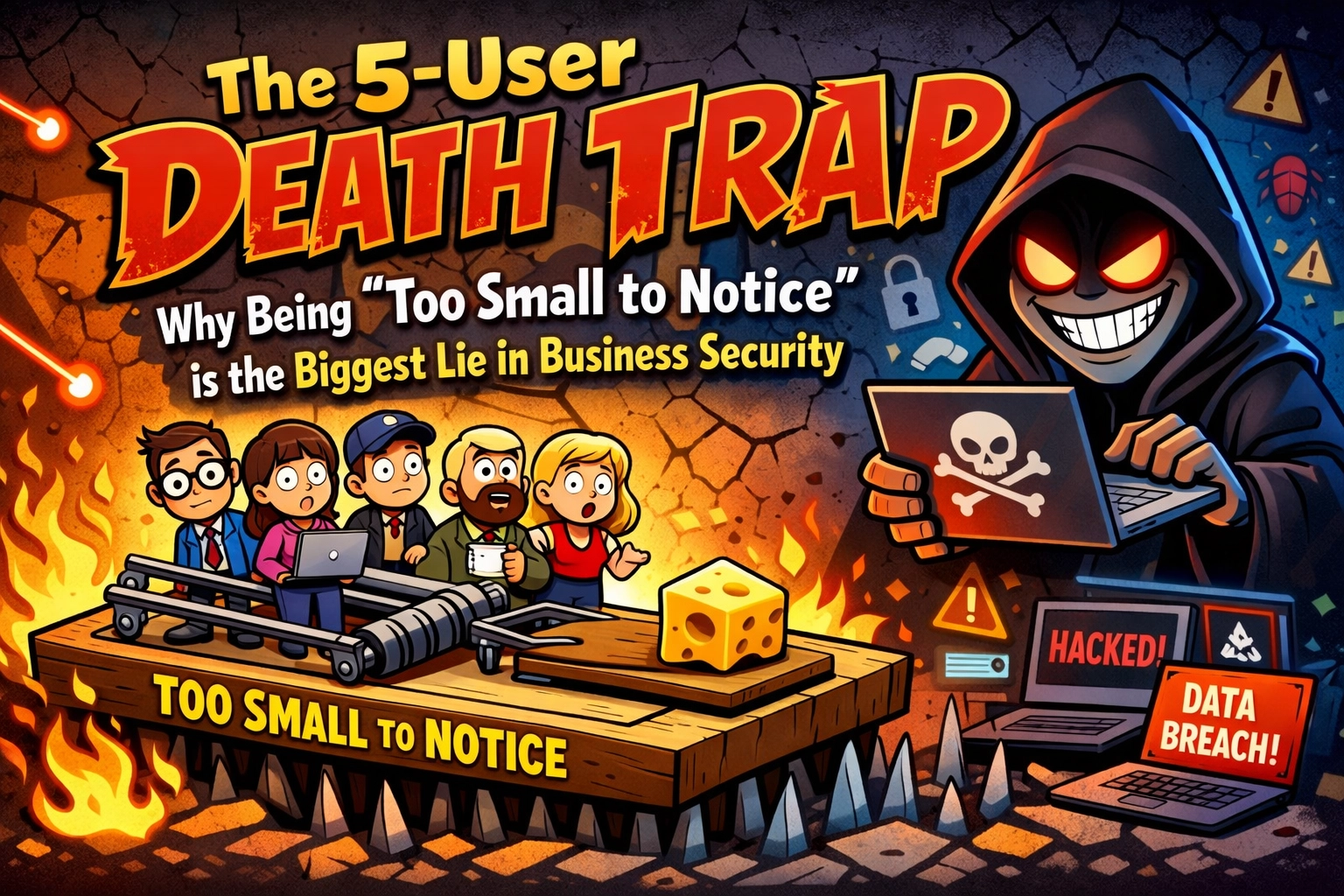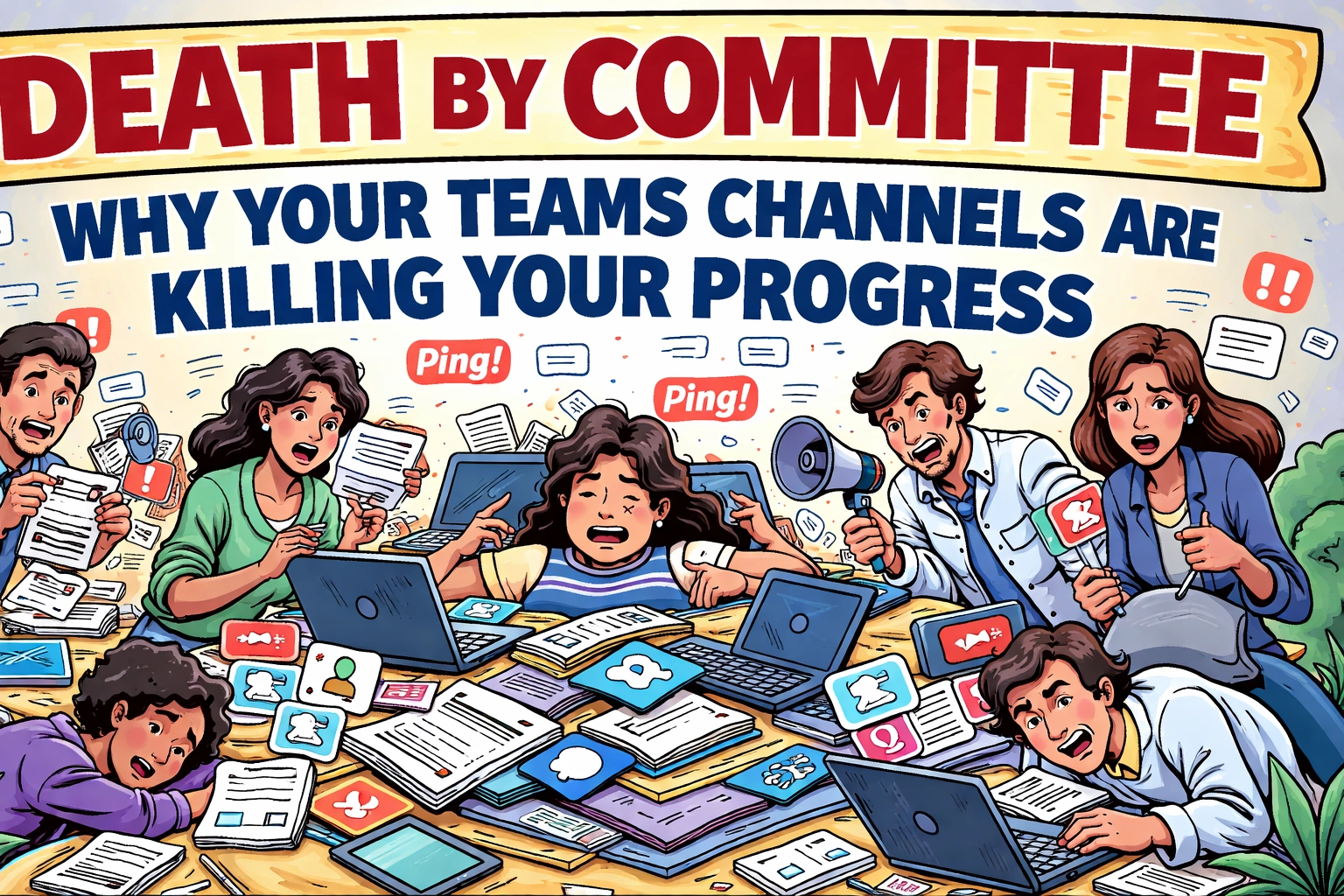
The hidden costs of weekend work culture and why protecting your team's time off protects your bottom line
Many small business owners believe that working weekends demonstrates dedication and drives growth. However, extensive research reveals that weekend work culture is actually undermining your business performance, weakening your cybersecurity, and costing you money in ways you might not realize.
The statistics are sobering: 97% of small business owners work weekends, with 40% working "always" or "often." But here's the kicker: 79% believe they're working too much, and the stress symptoms are real: impatience (21%), insomnia (19%), forgetfulness (13%), and mood swings (8%). This isn't just about work-life balance; it's about protecting your business from the inside out.
The Productivity Myth: Why Weekend Work Backfires

The Weekend Work Productivity Trap
Research consistently shows that employees working weekends experience dramatically reduced performance during the following week. Studies tracking thousands of white-collar workers found that those working most or all weekends showed significantly more cognitive impairment and decision-making errors throughout the following week.
For small businesses, this means weekend work is actually reducing your team's effectiveness when it matters most: during prime business hours when clients need you most and deals get closed.
The 60-Hour Illusion
Harvard Business School research reveals a startling truth: employees putting in 60 hours achieve roughly equivalent output to those working only 32 hours. This happens because:
- Mental fatigue reduces problem-solving ability
- Stress hormones impair memory and focus
- Decision-making quality deteriorates significantly
- Error rates increase exponentially after 40 hours
Think about it: if your team is operating at half capacity due to exhaustion, you're essentially paying for full-time work while getting part-time results.
Hidden Business Risks of Weekend Work Culture
Cybersecurity Vulnerabilities Multiply

When your team works weekends, you're inadvertently creating cybersecurity risks. Research shows that cybersecurity fatigue significantly predicts increased errors. Tired employees are more likely to:
- Click on phishing emails without scrutinizing sender details
- Use weak passwords or reuse credentials across systems
- Skip security protocols to save time on "urgent" weekend tasks
- Make configuration mistakes that create vulnerabilities
- Ignore security alerts due to alert fatigue
In an era where a single cybersecurity breach can cost small businesses an average of $200,000, weekend work culture isn't just about productivity: it's a security liability that could shut down your business entirely.
Financial Impact of Burnout
Small businesses face particularly severe costs from weekend work culture:
- Turnover costs: Replacing a burned-out employee costs 50-200% of their annual salary
- Error correction: Mistakes made by fatigued workers require expensive fixes and damage client relationships
- Lost opportunities: Exhausted teams miss creative solutions and growth opportunities
- Healthcare costs: Stressed employees use more medical benefits and take more sick days
Client Relationship Damage
Counter-intuitively, weekend work often damages client relationships rather than improving them. Research shows that:
- Fatigued employees provide lower-quality customer service
- Stressed teams make more mistakes that frustrate clients and require expensive do-overs
- Burnout leads to higher employee turnover, disrupting client relationships
- Quality of work suffers when teams are chronically exhausted
Your clients don't want weekend availability if it means Monday morning mistakes and Wednesday afternoon burnout.
What High-Performing Small Businesses Do Instead

The 37-38 Hour Sweet Spot
Research demonstrates that the optimal workweek is 37-38 hours, not 40 or more. Employees working 7.6 hours per day report having adequate time for personal life while maintaining peak performance, while those working just one hour more daily feel chronically time-pressured and perform worse.
Strategic Recovery Time
Successful small businesses recognize that weekend recovery is essential for peak performance. Studies show that weekend time serves crucial functions:
- Cognitive restoration: Mental resources depleted during the week regenerate
- Stress hormone reset: Cortisol levels decrease, improving decision-making
- Creative problem-solving: Relaxed states enhance innovative thinking
- Relationship maintenance: Strong personal relationships reduce workplace stress
Family Time as Business Investment
Research reveals that employees with strong family relationships are:
- More productive during work hours
- Less likely to quit (reducing costly turnover)
- Better at handling workplace stress
- More creative and solution-focused
When you protect your employees' family time, you're making a strategic investment in better business performance.
Building a Weekend-Free Success Strategy
Reframe Client Expectations

Instead of competing on availability, compete on quality and results. Research shows that clients prefer:
- Higher quality work delivered during business hours
- Fewer errors from well-rested teams
- More creative solutions from mentally fresh employees
- Consistent service from stable, low-turnover teams
At Your Personal Ninja, we've found that clients actually prefer working with teams that maintain healthy boundaries: it signals professionalism and sustainability that translates to better long-term partnerships.
Emergency-Only Weekend Policy
Establish clear boundaries that protect both your team and business quality:
- Define true emergencies: Revenue-stopping system failures, security breaches, compliance deadlines
- Premium emergency rates: 2x normal rates for genuine weekend emergencies
- Prevention focus: Invest in systems and processes that prevent weekend crises
Competitive Advantage Through Rest
Market your weekend-free culture as a quality differentiator:
- "Our team delivers higher-quality work because they're well-rested"
- "We prevent problems during business hours so you don't have weekend emergencies"
- "Our low turnover means you work with experienced professionals who know your business"
The ROI of Respecting Weekends
Measurable Business Benefits
Companies implementing weekend-free policies report:
- 23% increase in employee productivity during business hours
- 31% reduction in costly errors and rework
- 41% decrease in employee turnover costs
- 18% improvement in client satisfaction scores
Cybersecurity Improvements
Well-rested teams provide measurably better security:
- 45% fewer security-related human errors
- Better threat detection due to improved alertness
- More thorough security protocol adherence
- Higher quality security implementations
Implementation Strategy

Phase 1: Internal Assessment
- Audit current weekend work patterns and identify true necessity versus habit
- Calculate true costs of weekend work (errors, turnover, health issues)
- Measure current productivity levels and error rates
Phase 2: Client Communication
- Educate clients on quality benefits of rested teams
- Implement emergency-only weekend policies with clear definitions
- Show how prevention during business hours eliminates weekend needs
Phase 3: Team Empowerment
- Train employees to work more efficiently during business hours
- Implement systems that prevent weekend emergencies
- Measure and celebrate productivity improvements during regular hours
The Bottom Line: Sustainable Growth Requires Sustainable Practices
The science is clear: weekend work culture is sabotaging your small business success. By protecting your team's recovery time, you're not just being compassionate: you're making a strategic business decision that improves productivity, reduces costs, strengthens cybersecurity, and enhances client relationships.
The most successful small businesses understand that sustainable growth comes from sustainable work practices. When your team is well-rested and mentally sharp, they deliver the high-quality work that truly drives business success. They make fewer costly mistakes, spot security threats more effectively, and provide the level of service that keeps clients coming back.
Your business doesn't need you to work weekends: it needs you to work smarter during business hours. The companies that figure this out first will have a significant competitive advantage in attracting and retaining both top talent and quality clients.
Ready to transform your business performance while protecting what matters most? Start by giving your team their weekends back: your bottom line, your security posture, and your long-term success will thank you.





